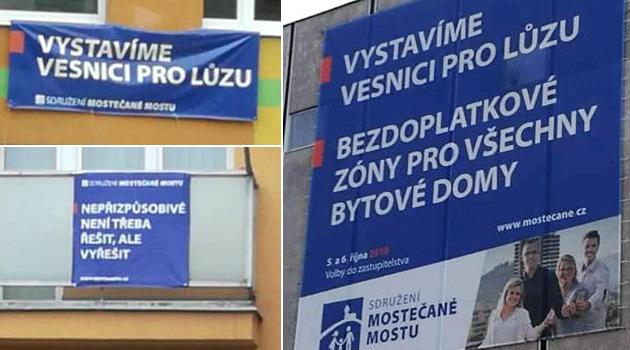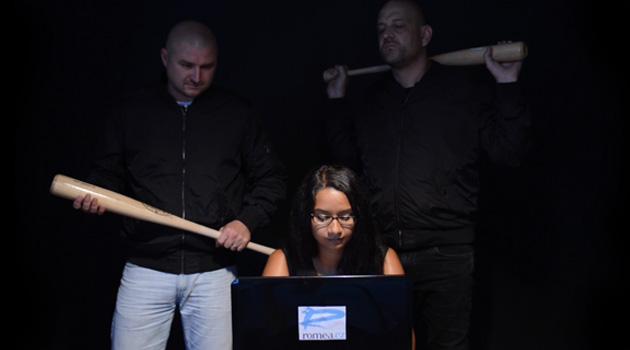In mid-August the RomanoNet and ROMEA organizations launched a campaign called “ME DŽAV! A so tu?” (I’M GOING! Are you?), the main aim of which was to awaken Romani voters’ interest in local elections. I was in charge of the online part of the campaign.
One of the slogans was: “Romale, go to the polls and cast your ballot for those to whom you matter!” Idealism, right?
My entire world revolved for two months just around politics, Romani civic engagement, and the voting campaigns in different parts of the Czech Republic. In addition to positive findings (such as, for example, that in the local elections apparently more than 300 Romani people ran for office) we ran into disgusting billboards and posters on a daily basis that were primarily aimed against Roma.
Take the slogan of the association “Most Residents for Most” (Mostečané Mostu) – “Inadaptables don’t just need to be addressed, they need the final solution.” Or the slogan with the “village for the riffraff”, which was probably seen by the entire country.
A couple of journalists reported on that campaign. Naturally, we did too.
The representatives of our state, whether in the executive branch or the legislature, of course, pretended to see nothing. By staying silent about such speech, they gave it their blessing.
Who are the riffraff?
Romani people contacted us rather frequently with messages like this: “Fine, we’ll go vote, but we don’t know for whom. After all, everybody is against us! Advise us – whom should we vote for?”
Not only did we not want to advise anybody for whom to vote – because that is the responsibility of each citizen to figure out – we couldn’t have advised them even if we wanted to. There does not exist a single party in the Czech Parliament that is also represented at local level and cares about us all living together here in harmony.
We kept answering again and again: “Take a look at who is running in your community. Read their election program. Make sure they are not against Romani people. Don’t sell your vote to anybody. Those who want to buy your vote don’t care about you. Go vote. Your vote is important.”
We filmed an election debate with Romani candidates who were in the leading slots on the candidate lists of different political parties from all over the country. It’s a good thing news server Romea.cz exists.
You won’t see such coverage anywhere else. Even Czech Television, the public broadcaster, is not interested in it.
Naturally, we don’t know who voted for whom. The ballot here is secret.
In any event, we can be glad about one thing. Those who are explicit in their attitude of rejecting Romani people did not succeed to the degree that they would have wanted.
Of the 4 500 candidates run who ran for the “Freedom and Direct Democracy” (SPD) movement, for example, just 150 were elected to local assemblies. Nevertheless, that does not mean those who now lead our cities and municipalities will not use more sophisticated instruments of manipulation, or that they won’t attempt to evict Romani people beyond their city limits.
We all know who it was that submitted a bill on housing benefit-free zones in the Chamber of Deputies, right? Moreover, in the leadership of these cities and municipalities, groups and parties like “Most Residents for Most” remain, and that means there is the danger their intention to build a “village for the riffraff” may yet manage to be implemented.
I had the opportunity to meet several Romani residents of Most. They shared with me a conversation they overheard between two little Romani boys about eight years old in which one boy asked the other: “Who are the riffraff?”
“You don’t know?” the other asked. “That’s us, the Roma!”
As a psychologist, this shakes me to the core. This is how the self-awareness of young Romani children is being formed in the Czech Republic?
Not only have these children already accepted the abusive term “gypsy” as a component of their identity, but now they are expanding their identity to include other kinds of invective without even comprehending the actual meaning of the word “riffraff” and the intention behind these campaigns? Good Lord – but from the highest political offices we hear nothing but silence…
Zeman’s insults
We keep moving forward nonetheless. The campaign is running along, we are glad Romani people are reacting to it and actively sharing the video challenges from Romani celebrities calling on other Romani voters in the Czech Republic to go to the polls because, after all, we too are citizens of this state and this is our home.
The elections are approaching, the campaign of “ME DŽAV! A so tu?“ is heading towards its finale. We are all working at full speed.
At night we are answering dozens of Romani people’s queries about where they are supposed to go vote, we look up the addresses of the polling places for them, we are sincerely interested. We film an instruction video about how to correctly fill out the ballot, we encourage each other, and with anxiety we wait to see how many of the Romani candidates will manage to succeed.
Just before the elections, finally, somebody in high politics speaks up. It is President Miloš Zeman himself.
“I decidedly am no friend of communism, but during communism the Roma had to work. Most of them worked as ditch-diggers, and if they refused to work, they were considered work-shy and went to prison,” Zeman said in Kojetín during a three-day visit to the Olomouc Region.
“The Romani labor platoons were led by Romani men who had natural authority. If somebody on their team didn’t work, they slapped him around. It’s a very humane method that worked most of the time,” the President said, to which Olomouc Regional Governor Ladislav Okleštěk and Mayor of Kojetín Jiří Šírek responded by laughing.
A great deal has already been written about this foul of Zeman’s. Of course, his use of those particular words, “work-shy”, naturally brought to mind a certain visual image for me – the photographs of the Romani victims of the Holocaust perpetrated at Lety u Písku and Auschwitz.
Those photographs include children. That’s always whom I think of most.
Thanks, Miloš, for reminding me of that. What followed was enthusiasm and idealism!
Mr Pongo challenged Romani people on Facebook to send in photographs of themselves at work – and they responded. It was the kind of reaction that once would have seemed almost humiliating to me, but at that moment it pleased me greatly.
Zeman responded to the working Roma who talked back in his own inimitable way. He insulted Romani people even more.
The president manipulated figures to allege that 90 % of Romani people here do not work. It was the very same Friday the polls opened.
I don’t even want to know whom Zeman voted for. Once again, the silence was deafening.
Romea.cz was the only media outlet to respond, informing the public and shedding light on the problem. We did the job of those who should have responded and did not.
The Czech media aren’t going to stress themselves out about some Roma being maligned, right? “In the Czech Republic there are an estimated 150 000 economically active Romani people. Among the socially excluded, 75 000 are economically active. If we were to use the most recent figures from the year 2015, then about 50 000 Romani people living in those localities are jobless. That means 70 % of the Romani people in the country work for a living,” ROMEA reported on Romea.cz.
The President, of course, is apparently incapable of self-reflection. He should take a look at himself in the mirror and give himself a couple of slaps for having surrounded himself with populists and xenophobes and further polarizing society.
During the local elections, 12 Romani candidates won office. In excluded localities, voter turnout increased.
“ME DŽAV! A so tu?” made sense. Those sleepless nights were worth it.
You Have the Floor
It’s the Monday after the first round of voting. The phone rings.
Public broadcaster Czech Television is calling. It’s the dramaturg of the “You Have the Floor” (Máte slovo) program.
She wants to invite me to participate in a debate about President Zeman’s remarks about Romani people and their work morale and their abuse of welfare. I’ve had enough.
That program is where Czech Television believes it should offer us the opportunity to express our opinions? I refuse to participate in Czech Television’s most populist program, one that has ridiculed Romani people from the beginning of its existence.
The format of the program is to pit two irreconcilable camps against each other – racists and Romani people – and it is the very last thing we need at this moment. I called on other Romani people not to participate either.
That program has been criticized for many years already – including by members of the Council on Radio and Television Broadcasting – for its lack of balance in terms of opinions and its support of populism. Its main aim is to create generalizations and increase tensions among the parties appearing, supported by the moderator, Michaela Jílková, and an audience that applauds on cue.
This manipulation happens live and is paid for by the television fees of the Czech taxpayer. Not only should Czech Television cancel that program, they should seriously assess the degree to which they are contributing to creating a negative image of Romani people in the Czech Republic.
Czech Television should not ignore the boycott of this show by many Romani people and representatives of the other important institutions that were contacted to participate and declined. Or will the silence from those in charge be deafening once again?
First published on news server A2larm.cz

